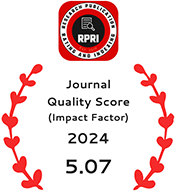NEP-2020 Awareness among Teachers: A Study of Knowledge, Perceptions and Challenges
DOI:
https://doi.org/10.55544/jrasb.3.6.3Keywords:
NEP, National Education Schemes, Technology IntegrationAbstract
New Education Policy 2020 has been announced by honorable Prime Minister of India, Shri Narendra Modi Ji to make India a knowledgeable vibrant country which is a current need of 21st century. The policy aims to promote the role of teachers in Indian society and culture and to develop fundamental skills in students as well as social, ethical, emotional and critical thinking skills in all students. However, there is no sufficient implementation of NEP -2020 yet. This study was conducted to explore the knowledge of teachers about NEP-2020. It was a questionnaire based study consisting of 10 questions. All data were analyzed in MS-Excel, SPSS. A significant proportion of teachers (68%) have foundational knowledge of current educational policy, indicating a basic knowledge that is essential for effective implementation. However, 52% of teachers were not aware about the role of NEP in higher education system, national education schemes. Only 20% of educators express confidence in using these frameworks. Most of the respondents deny to be benefited from National Education Schemes due to lack of awareness, highlighting the critical need for targeted professional development and support. Key gaps in technology integration and policy understanding were identified, highlighting areas where teachers need additional training and resources. Seminars should be organized regularly to keep teachers informed about national programmes and their implementation.
Downloads
References
Kurien, Ajay & Chandramana, Sudeep. (2020). Impact of New Education Policy 2020 on Higher Education. 10.6084/m9.figshare.13332413.v1.
Nandini, ed. (29 July 2020). "New Education Policy 2020 Highlights: School and higher education tosee major changes". Hindustan Times
Chopra, Ritika (2 August 2020). "Explained: Reading the new National Education Policy 2020". The Indian Express
Maseeh, Minhajullah. (2023). Innovations and new reforms in teacher education: adapting to the vision of national education policy (nep) 2020. Vidya - a journal of Gujarat university. 2. 262- 266.
Zafarullah, Tahira & Kanwal, Asma & education, FAIZA & education, DR & Blinds, KASHIF. (2022). Job Satisfaction of Private Special Education Teachers About Teaching Profession: Perception of Special Education Teachers. PalArch’s Journal of Archaeology of Egypt/ Egyptology. 19. 2022.
Zafarullah, Tahira & Kanwal, Asma & education, FAIZA & education, DR & Blinds, KASHIF. (2022). Job Satisfaction of Private Special Education Teachers About Teaching Profession: Perception of Special Education Teachers. PalArch’s Journal of Archaeology of Egypt/ Egyptology. 19. 2022.
Sarker, M. F. H., Mahmud, R. A., Islam, M. S., & Islam, M. K. (2019). Use of e-learning at higher educational institutions in Bangladesh: Opportunities and challenges. Journal of Applied Research in Higher Education, 11(2), 210-223.
Serdyukov, P. (2017). Innovation in education: what works, what doesn’t, and what to do about it?. Journal of research in innovative teaching & learning, 10(1), 4-33.
Condliffe, B. (2017). Project-Based Learning: A Literature Review. Working Paper. MDRC.
Ahrari, S., Roslan, S., Zaremohzzabieh, Z., Mohd Rasdi, R., & Abu Samah, A. (2021). Relationship between teacher empowerment and job satisfaction: A Meta-Analytic path analysis. Cogent Education, 8(1), 1898737.
Patel CN. A Study on Issues and Challenges of Nep 2020 In Higher Education. Meadow International Journal of Advancements in Multidisciplinary Research. 2024 Jan 31;2(1):48-54.
Dunbar, K., & Yadav, A. (2022). Shifting to student-centered learning: Influences of teaching a summer service learning program. Teaching and Teacher Education, 110, 103578.
Ates, C. B., & Aktamis, H. (2024). Investigating the effects of creative educational modules blended with Cognitive Research Trust (CoRT) techniques and Problem Based Learning (PBL) on students' scientific creativity skills and perceptions in science education. Thinking Skills and Creativity, 51, 101471.
Jones, B. D. (2020). Motivating and engaging students using educational technologies. Handbook of research in educational communications and technology: Learning design, 9-35.
Zheng, L., Wang, C., Liu, T., & Gu, X. (2023). Inspecting technology-related quality of teaching artifacts to understand teachers' technology adoption. IEEE Transactions on Learning Technologies, 16(6), 940-954.
Downloads
Published
How to Cite
Issue
Section
License
Copyright (c) 2024 Heena, Kumar Roshan, Singh Chetan, Singh Vikram

This work is licensed under a Creative Commons Attribution-NonCommercial-NoDerivatives 4.0 International License.


















